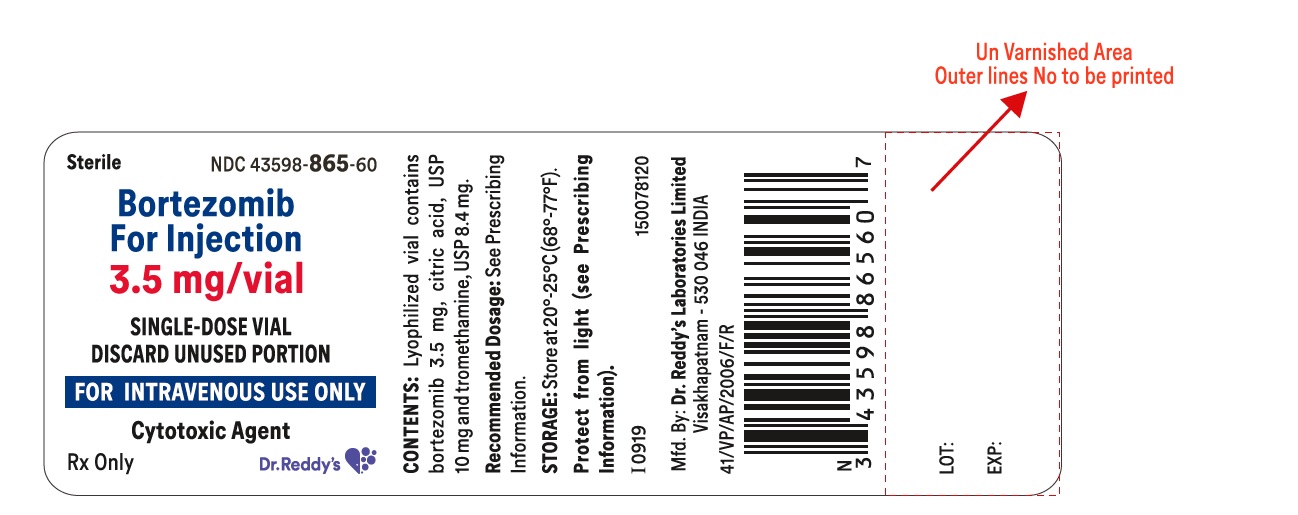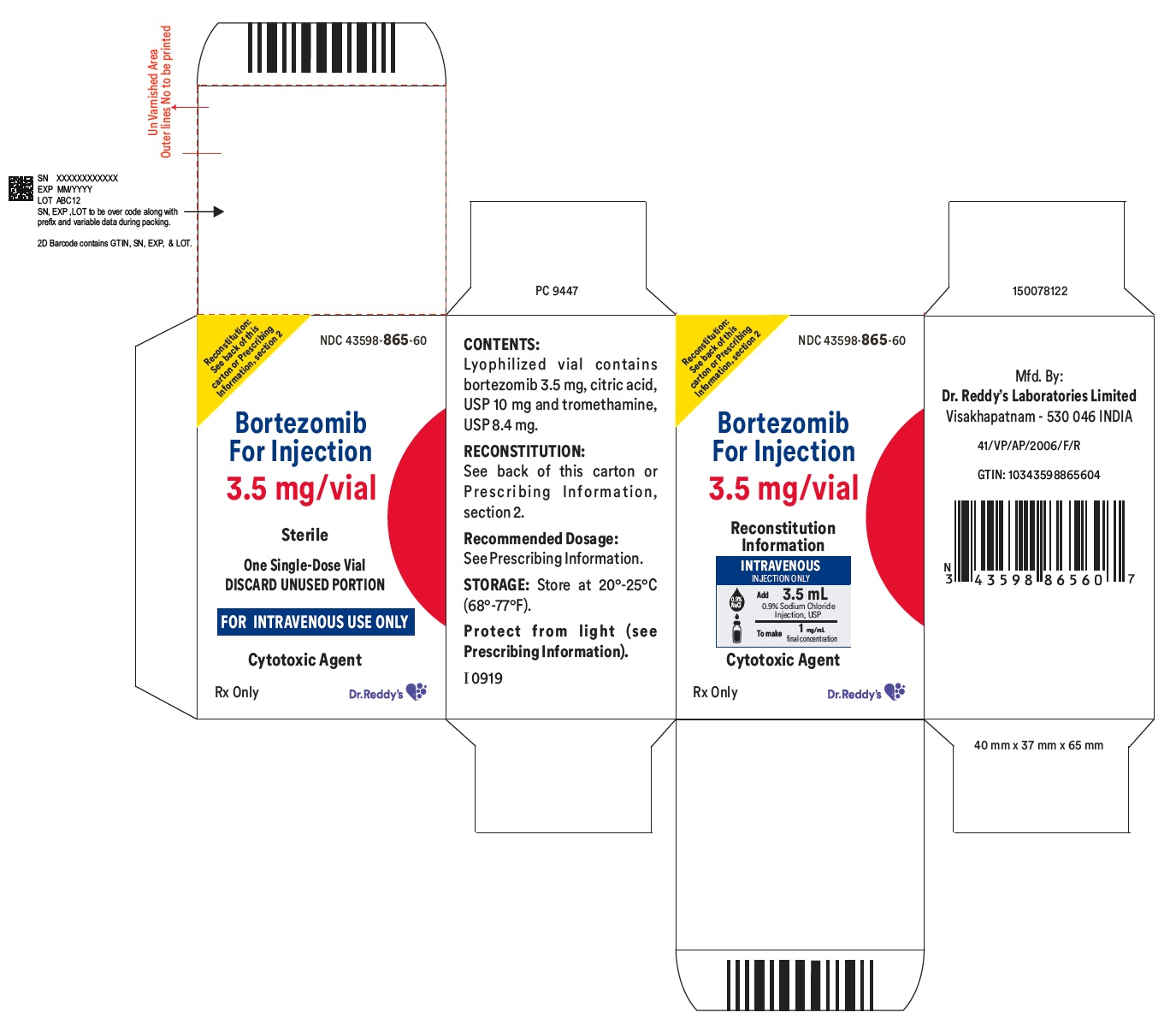Bortezomib
Generic name: bortezomib
Brand name: Velcade
Dosage forms: injectable powder for injection (3.5 mg); intravenous powder for injection (3.5 mg)
Drug class: Proteasome inhibitors
Medically reviewed by A Ras MD.
What is bortezomib?
Bortezomib is used to treat multiple myeloma. It is used to treat a type of lymphoma. Bortezomib may be given to you for other reasons.
Description
Bortezomib for injection contains bortezomib which is an antineoplastic agent. Bortezomib is a modified dipeptidyl boronic acid. The chemical name is [(1R)-3-methyl-1-[[(2S)-1-oxo-3-phenyl-2-[(pyrazinylcarbonyl)amino]propyl]amino]butyl] boronic acid. The molecular formula is C19H25BN4O4. The molecular weight is 384.24. Bortezomib has the following molecular structure:

The solubility of bortezomib, as the monomeric boronic acid, in water is 0.8 to 0.9 mg/mL in a pH range of 2 to 6.5.
Bortezomib for injection is available for intravenous injection use. Each single-dose vial contains 3.5 mg of bortezomib as a sterile lyophilized cake or powder. The inactive ingredients are citric acid, USP 10 mg and tromethamine, USP 8.4 mg. The product is provided as a citric acid boronic ester which, in reconstituted form, consists of the citric acid ester in equilibrium with its hydrolysis product, the monomeric boronic acid. The drug substance exists in its cyclic anhydride form as a trimeric boroxine.
Mechanism of Action
Bortezomib is a reversible inhibitor of the chymotrypsin-like activity of the 26S proteasome in mammalian cells. The 26S proteasome is a large protein complex that degrades ubiquitinated proteins. The ubiquitin-proteasome pathway plays an essential role in regulating the intracellular concentration of specific proteins, thereby maintaining homeostasis within cells. Inhibition of the 26S proteasome prevents this targeted proteolysis, which can affect multiple signaling cascades within the cell. This disruption of normal homeostatic mechanisms can lead to cell death. Experiments have demonstrated that bortezomib is cytotoxic to a variety of cancer cell types in vitro. Bortezomib causes a delay in tumor growth in vivo in nonclinical tumor models, including multiple myeloma.
Before taking bortezomib, tell your doctor:
- If you are allergic to bortezomib; any part of this medicine; or any other drugs, foods, or substances. Tell your doctor about the allergy and what signs you had.
- If you take any drugs (prescription or OTC, natural products, vitamins) that must not be taken with bortezomib, like certain drugs that are used for HIV, infections, or seizures. There are many drugs that must not be taken with bortezomib.
- If you are taking St. John’s wort. Do not take St. John’s wort with bortezomib. This medicine may not work as well.
- If you are breast-feeding. Do not breast-feed while you take bortezomib or for 2 months after your last dose.
This is not a list of all drugs or health problems that interact with bortezomib.
Tell your doctor and pharmacist about all of your drugs (prescription or OTC, natural products, vitamins) and health problems. You must check to make sure that it is safe for you to take bortezomib with all of your drugs and health problems. Do not start, stop, or change the dose of any drug without checking with your doctor.
What are some things I need to know or do while I take bortezomib?
- Constipation, diarrhea, throwing up, and upset stomach are common with bortezomib. If these happen, talk with your doctor about ways to lower these side effects. Call your doctor right away if any of these effects bother you, do not go away, or get very bad.
- Avoid driving and doing other tasks or actions that call for you to be alert until you see how bortezomib affects you.
- To lower the chance of feeling dizzy or passing out, rise slowly if you have been sitting or lying down. Be careful going up and down stairs.
- Call your doctor right away if you have any signs of infection like fever, chills, flu-like signs, very bad sore throat, ear or sinus pain, cough, more sputum or change in color of sputum, pain with passing urine, mouth sores, or a wound that will not heal.
- Heart failure has happened with bortezomib, as well as heart failure that has gotten worse in people who already have it. Tell your doctor if you have heart disease. Call your doctor right away if you have shortness of breath, a big weight gain, a heartbeat that is not normal, or swelling in the arms or legs that is new or worse.
- Nerve problems like numbness, pain, or a burning feeling in the feet or hands can happen in people taking bortezomib and may get worse in people who already have them. Call your doctor right away if you have signs of nerve problems like not able to handle heat or cold, a lower sense of touch, or burning, numbness, tingling, pain, or weakness in the arms, hands, legs, or feet.
- Very bad and sometimes deadly blood problems like thrombotic thrombocytopenic purpura/hemolytic uremic syndrome (TTP/HUS) have happened with bortezomib in some people. Call your doctor right away if you feel very tired or weak or have any bruising or bleeding; dark urine or yellow skin or eyes; pale skin; change in the amount of urine passed; change in eyesight; change in strength on 1 side is greater than the other, trouble speaking or thinking, or change in balance; or fever.
- This medicine may affect fertility. Fertility problems may lead to not being able to get pregnant or father a child.
- If you are a man and have sex with a female who could get pregnant, protect her from pregnancy during treatment and for at least 4 months after your last dose.
- If you are a man and your sex partner gets pregnant while you take bortezomib or within 4 months after your last dose, call your doctor right away.
- This medicine may cause harm to the unborn baby if you take it while you are pregnant.
- If you are able to get pregnant, a pregnancy test will be done to show that you are NOT pregnant before starting bortezomib. Talk with your doctor.
- Use birth control that you can trust to prevent pregnancy while taking bortezomib and for at least 7 months after stopping bortezomib.
- If you get pregnant while taking bortezomib or within 7 months after your last dose, call your doctor right away.
How is bortezomib best taken?
Use bortezomib as ordered by your doctor. Read all information given to you. Follow all instructions closely.
- It is given as a shot into a vein or into the fatty part of the skin.
- This medicine must not be given into the spine.
- Have blood work checked as you have been told by the doctor. Talk with the doctor.
- Tell all of your health care providers that you take bortezomib. This includes your doctors, nurses, pharmacists, and dentists.
- Drink lots of noncaffeine liquids unless told to drink less liquid by your doctor.
- If diarrhea or throwing up happens, talk with the doctor. You will need to make sure to avoid dehydration and electrolyte problems.
- If you have high blood sugar (diabetes), you will need to watch your blood sugar closely.
- You may have more chance of getting an infection. Wash hands often. Stay away from people with infections, colds, or flu.
- You may bleed more easily. Be careful and avoid injury. Use a soft toothbrush and an electric razor.
What do I do if I miss a dose?
- Call your doctor to find out what to do.
What are the side effects of bortezomib that I need to call my doctor about immediately?
WARNING/CAUTION: Even though it may be rare, some people may have very bad and sometimes deadly side effects when taking a drug. Tell your doctor or get medical help right away if you have any of the following signs or symptoms that may be related to a very bad side effect:
- Signs of an allergic reaction, like rash; hives; itching; red, swollen, blistered, or peeling skin with or without fever; wheezing; tightness in the chest or throat; trouble breathing, swallowing, or talking; unusual hoarseness; or swelling of the mouth, face, lips, tongue, or throat.
- Signs of liver problems like dark urine, feeling tired, not hungry, upset stomach or stomach pain, light-colored stools, throwing up, or yellow skin or eyes.
- Signs of high or low blood pressure like very bad headache or dizziness, passing out, or change in eyesight.
- Weakness on 1 side of the body, trouble speaking or thinking, change in balance, drooping on one side of the face, or blurred eyesight.
- Any unexplained bruising or bleeding.
- Throwing up blood or throw up that looks like coffee grounds.
- Black, tarry, or bloody stools.
- Feeling very tired or weak.
- Irritation where the shot is given.
- Some people have had lung problems with bortezomib. Sometimes, this has been deadly. Call your doctor right away if you have signs of lung problems like shortness of breath or other trouble breathing, cough that is new or worse, or fever.
- Patients with cancer who take bortezomib may be at a greater risk of getting a severe health problem called tumor lysis syndrome (TLS).This may lead to death. Call your doctor right away if you have a fast or abnormal heartbeat; any passing out; trouble passing urine; muscle weakness or cramps; upset stomach, throwing up, diarrhea, or not able to eat; or feel sluggish.
- A very bad and sometimes deadly brain problem called posterior reversible encephalopathy syndrome (PRES) has happened with bortezomib. Call your doctor right away if you have signs like feeling confused, lowered alertness, change in eyesight, loss of eyesight, seizures, or very bad headache.
What are some other side effects of bortezomib?
All drugs may cause side effects. However, many people have no side effects or only have minor side effects. Call your doctor or get medical help if any of these side effects or any other side effects bother you or do not go away:
- Dizziness.
- Stomach pain.
- Not hungry.
- Feeling tired or weak.
- Trouble sleeping.
- Headache.
These are not all of the side effects that may occur. If you have questions about side effects, call your doctor. Call your doctor for medical advice about side effects.
You may report side effects to the FDA at 1-800-332-1088. You may also report side effects at https://www.fda.gov/medwatch.
If overdose is suspected:
If you think there has been an overdose, call your poison control center or get medical care right away. Be ready to tell or show what was taken, how much, and when it happened.
How do I store and/or throw out bortezomib?
- If you need to store bortezomib at home, talk with your doctor, nurse, or pharmacist about how to store it.
Label
- PRINCIPAL DISPLAY PANEL

- PRINCIPAL DISPLAY PANEL

